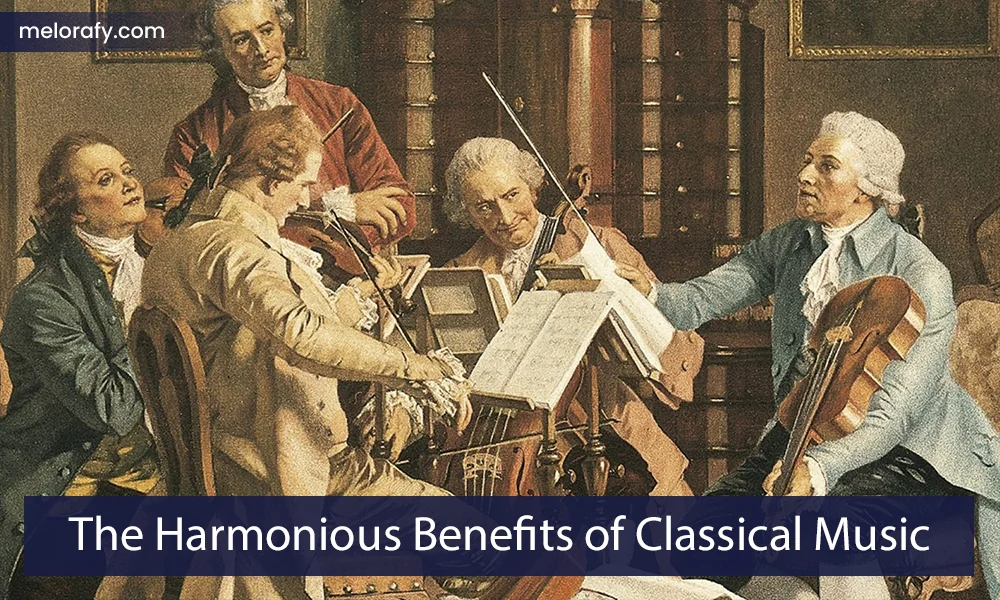
The Harmonious Benefits of Classical Music
In a world where the music landscape is as diverse as it is vast, classical music stands out as a genre that transcends time and culture, offering a plethora of benefits that enrich both the mind and soul. From the intricate compositions of Bach and the emotive symphonies of Beethoven to the timeless operas of Mozart, classical music has long been revered for its artistic depth and emotional resonance. Beyond its aesthetic appeal, however, lies a multitude of benefits that underscore its enduring relevance in our modern lives. This article explores the myriad ways in which classical music can enhance our well-being, cognitive functions, and overall quality of life.
One of the most popular styles of music from the past to the present has been the classical style, and this style is very popular among different people, and what kind of style this style is and why it has so many fans is fully explained in this content from Melorafy We check.
Enhancing Cognitive Performance
One of the most celebrated benefits of classical music is its impact on the brain. Numerous studies have shown that listening to classical music can boost cognitive functions such as memory, attention, and problem-solving skills. The so-called “Mozart Effect,” a term coined from a study that suggested listening to Mozart’s compositions could temporarily enhance spatial-temporal reasoning, highlights the potential of classical music to stimulate cognitive enhancement. While subsequent research has nuanced these findings, the consensus remains that classical music can facilitate cognitive performance and productivity, making it a valuable companion for studying, working, and creative endeavors.
Stress Reduction and Relaxation
In our fast-paced and often stressful modern environment, finding effective ways to relax and decompress is crucial for maintaining mental health and well-being. Classical music emerges as a powerful tool in this regard, with its soothing melodies and harmonious arrangements proven to lower stress levels and promote relaxation. The slow tempo and predictable structure of many classical pieces can help slow the pulse and heart rate, reduce blood pressure, and decrease levels of stress hormones. By creating a calming atmosphere, classical music provides a sanctuary of peace and tranquility, aiding in meditation, mindfulness practices, and deep relaxation.
![]()
Emotional Well-being and Mood Enhancement
Classical music’s emotional depth can have a profound impact on the listener’s mood and emotional state. It has the unique ability to evoke a wide range of emotions, from joy and exhilaration to deep contemplation and serenity. Listening to classical music can serve as an emotional outlet, allowing individuals to experience and process their feelings in a constructive manner. Moreover, the aesthetic beauty and emotional expression found in classical compositions can uplift the spirit, combat depression, and enhance overall mood.
Sleep Quality Improvement
Struggling with sleep is a common issue that affects a significant portion of the population. Classical music can be a natural remedy for insomnia and other sleep disorders. The soothing qualities of classical pieces, especially those with a slow tempo and gentle rhythms, can help calm the mind and prepare the body for sleep. By incorporating classical music into bedtime routines, individuals can improve their sleep quality, falling asleep faster and enjoying more restorative rest.
Cultural and Educational Benefits
Engaging with classical music also offers cultural and educational advantages. It connects listeners with centuries of musical tradition and history, fostering an appreciation for the arts and humanities. Classical music can enhance cultural literacy, exposing individuals to different historical periods, geographical contexts, and philosophical ideas. For children and adults alike, learning about classical music or learning to play a classical instrument can improve concentration, discipline, and patience, as well as provide a rewarding sense of achievement.
The benefits of classical music are as diverse as the genre itself, encompassing cognitive, emotional, and physical well-being. Whether through enhancing brain function, reducing stress, improving mood, aiding sleep, or enriching cultural knowledge, classical music has the power to positively impact our lives in myriad ways. In a world often dominated by the immediate and the ephemeral, classical music invites us to pause, listen, and reflect, offering a symphony for the soul that resonates beyond the final note.
![]()
Modern classical era
The music of this period, which is specific to the 20th century, started with the continuation of romantic works and was influenced by the modernism of the 20th century. The description of these influences that entered classical music (and other arts) in very different ways is not included in this article. Maybe it can only be said that in general, dissonance gradually replaced consonance (of course, the Persian translation of these two words may not convey the meaning very well).
Sergei Rachmaninoff, Dmitri Shostakovich, Igor Stravinsky, Carl Orff, Richard Strauss, George Gershwin and Arnold Schoenberg are some of the famous composers of this period. It should be said that this period can be called the period of gradual decline of classical music and its replacement by modern music.
![]()
A piece for piano (Rachmaninoff)
Suite for Orchestra (Shostakovich)
Carmina (Karl Orf)
An American in Paris (Gershwin)